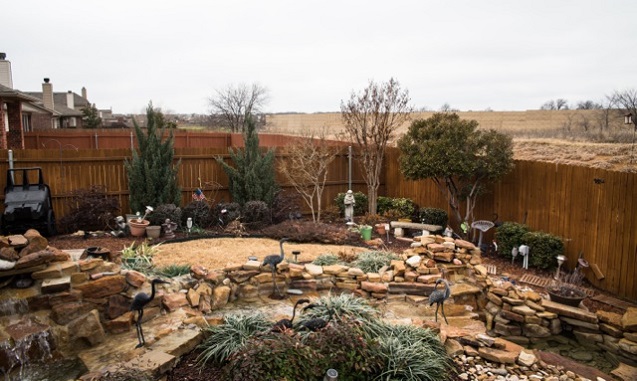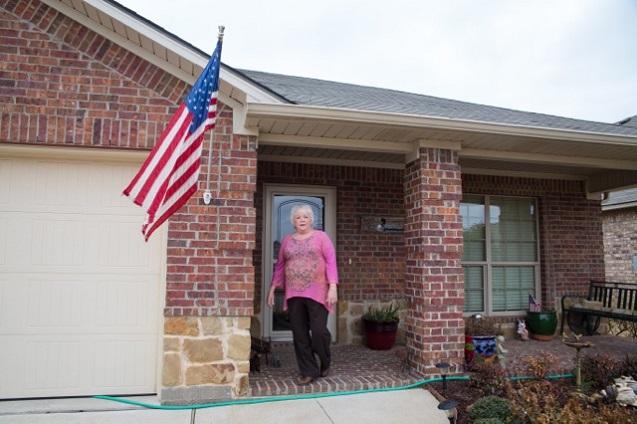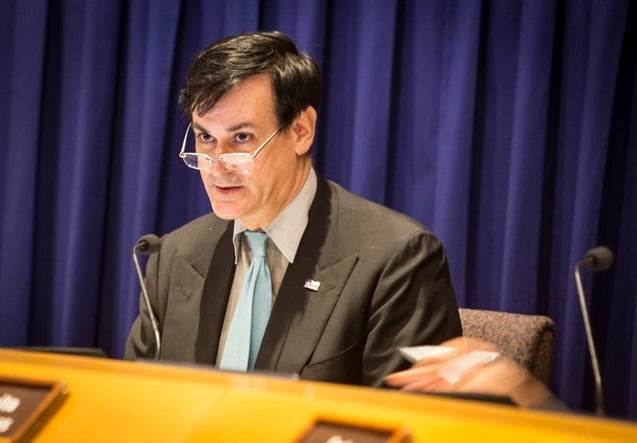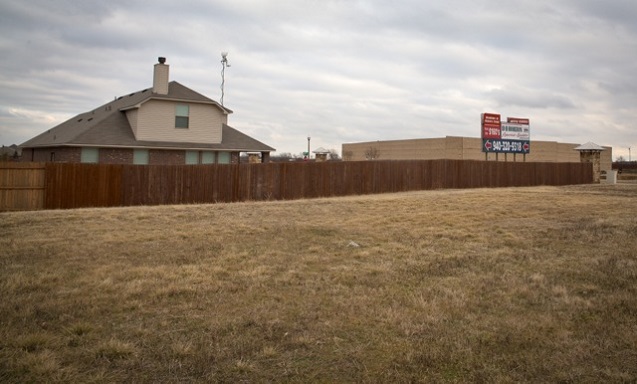
Part of the Series
Gas Rush: Fracking in Depth
Support justice-driven, accurate and transparent news — make a quick donation to Truthout today!
Maile Bush’s three-bedroom home is sandwiched between two EagleRidge Energy fracking sites in Denton, Texas. Towering temporary walls block her view of the frack sites, but nothing can stop the noise, lights and fumes from infiltrating her property.
Bush’s formerly safe, quiet suburban neighborhood is now a dangerous industrial zone. Last October, when she learned about EagleRidge’s plans to frack under the D.H. Horton subdivision her house is part of, ‘Meadows at Hickory Creek,’ Bush started asking questions.
The answers she found — and the stress of living about 500 feet from one drill site and 800 feet from another — have caused constant strain on her family’s health.
Bush has been keeping her kids inside since the fracking started. She and her husband have been weighing relocation, but moving is costly and selling, difficult. In an interview with DeSmogBlog, Bush said,
“Who would want to buy my home now? My kids like their schools. My husband’s job is here. And where would we move?”
Any property available nearby would still be part of the Barnett Shale, where the fracking industry continues to grow.
In February, flowback from the second well site began. Flowback is the stage in the hydraulic fracturing process when gas and/or oil is released after a combination of water, silica, and chemicals are injected into the ground at high pressure, fracturing the shale to release it, then causing the mixture to surge as “flowback.”
 Flowback at an EagleRidge Energy site next to the subdivisions at Bonnie Brea Street and Vintage Boulevard. (Photo: ©2014 Julie Dermansky)
Flowback at an EagleRidge Energy site next to the subdivisions at Bonnie Brea Street and Vintage Boulevard. (Photo: ©2014 Julie Dermansky)
Denton resident Cathy McMullen points out that flowback is the most toxic part of the fracking process. “Not only does natural gas come back up but also benzene, toluene, methane and other toxic chemicals used to frack.”
McMullen, who lives in Denton’s North Bonnie Brae neighborhood, knows what Bush is going through. She and her husband moved from Decatur, Texas in 2009 after fracking started there, only to have Range Resources frack near her new home in 2010. Since then, she has been fighting back.
 Cathy McMullen at a city council meeting. (Photo: ©2014 Juile Dermansky)
Cathy McMullen at a city council meeting. (Photo: ©2014 Juile Dermansky)
In January 2013, the Denton City Council passed an ordinance requiring a 1200 foot setback for drilling next to homes, schools and hospitals. But the regulation has a loophole exempting sites that were drilled before the ordinance was passed. As a result, it was possible for sites to be drilled as close as 200 feet to some residences.
Citizens fought the exemption at city council meetings but lost, so those living in the subdivisions in Denton’s South Bonnie Brae neighborhood are currently feeling the consequences of inadequate protection.
Debbie Ingram lives a few houses away from Maile Bush. Her backyard overlooks one of the EagleRidge Energy sites, approximately 200 feet away. Ingram designed her backyard to be a personal sanctuary, but no one could call it that now. Her bird feeder remains full, but the birds all disappeared after the fracking started. “The birds are smarter than the people,” she points out.
Ingram has no plans to move. “I’m too old,” she says. “I can only hope the fracking process will be over soon and that they won’t return for years to come.”
But that is not something anyone can count on. Fracking sites are designed to be fracked multiple times.
 Debbie Ingram’s backyard with view of a temporary wall at the EagleRidge fracking site. (Photo: ©2014 Julie Dermansky)
Debbie Ingram’s backyard with view of a temporary wall at the EagleRidge fracking site. (Photo: ©2014 Julie Dermansky)
 Debbie Ingram in front of her home in ‘Meadows at Hickory Creek’ subdivision. (Photo: ©2014 Julie Dermansky)
Debbie Ingram in front of her home in ‘Meadows at Hickory Creek’ subdivision. (Photo: ©2014 Julie Dermansky)
On February 4th, the Denton City Council voted on extending a “Standstill Agreement” that prevents EagleRidge Energy from drilling at any wells within the city except specific wells listed in the agreement for a set period of time.
Bush, McMullen and Ingram were among nearly a hundred concerned citizens who attended the council meeting to call for a moratorium on fracking to replace the “Standstill.” Many at the meeting believe the “Standstill Agreement” was erroneously named because it doesn’t stop EagleRidge from drilling the sites closest to them.
According to Bush, It was during the “Standstill” that the city issued permits to the drill sites located on either side of the Meadows at Hickory Creek subdivision.
In an email to DeSmogBlog, Denton Mayor Mark Burroughs said:
“The city tried to stop that specific drilling location in court and we lost. Pre-existing wells and/or sites with permits or zoning for drilling pose another impediment to city regulations even on nuisance prevention/minimization due to a State law called the vested rights statute.”
Cathy McMullen doesn’t agree. In a comment she posted on Denton councilman Kevin Rodin’s blog, she wrote,
“A new hole in the ground is a new well site. It requires a new permit from the Texas Railroad Commission and therefore is not a vested rights well. A platt or a lease is not a new permit. The city is not doing its job in enforcing its own lousy ordinances.”
At the meeting, Alyse Ogletree invited the council to visit her backyard and see if they thought it was useable. She implored them to at least enforce the town’s noise ordinance.
 Alyse Ogletree addresses the city council. (Photo: ©2014 Julie Dermansky)
Alyse Ogletree addresses the city council. (Photo: ©2014 Julie Dermansky)
Mayor Burroughs, who recently bought a two million dollar condo in Dallas where there is no drilling due to a 1,500 foot setback requirement, hasn’t visited the Meadows at Hickory Creek subdivision.
“I have heard the sounds and trust our citizens. I also live not far from a couple of well sites. The only solace is that it is a very temporary problem and once drilled and fracked, no substantive value impact continues,” Burroughs said.
But the fracking industry themselves touts the abundance of the Barnett shale, and speak of expanding operations in the area, not moving on. On Exxon’s website Ken Cohen wrote, “The Barnett Shale is expected to continue to generate economic stimulus for local area and state economies for decades to come.”
 Denton’s Mayor Mark Burroughs at a city council meeting. (Photo: © 2014 Julie Dermansky)
Denton’s Mayor Mark Burroughs at a city council meeting. (Photo: © 2014 Julie Dermansky)
Since the last council meeting, the Denton Drilling Awareness Group has changed strategies. Instead of trying to get a temporary moratorium on fracking, they plan to turn Denton into a frack-free city, making it the first in Texas to ban fracking outright. On February 12, they held a party to begin the process of gathering signatures for their new initiative. They got over 200 or the 596 needed before the city council has to consider adopting their proposed ordinance.
City Councilman Kevin Roden told Al Jazeera that he has doubts about the chances of success for the ban: “We live in a state that is arguably the most pro-oil and gas development state in the nation, where laws and policies are in place to encourage such development and prevent obstacles.”
However, Maile Bush remains hopeful the Denton Drilling Awareness group will stop the fracking. She closed her comments at the city council meeting with Margaret Mead’s quote: “Never doubt that a small group of thoughtful, committed, citizens can change the world. Indeed, it is the only thing that ever has.”
As of February 23, the group has more than half the signatures needed. McMullen has no doubt they’ll get the rest within the 180-day period.
If the council rejects the group’s petition, Denton citizens would vote on the proposal in a special election that must be held within two months, according to the city’s own protocol.
McMullen feels confident the residents of Denton will pass this no-fracking ordinance.
“This is not a pipe dream,” McMullen says. “Even Exxon’s CEO Rex Tillerson realizes fracking industry sites near his home will bring down his property value and has joined in a class action suite to stop a development next to his multi-million dollar Texas ranch. Now is the time. We can really do this.”
 EagleRidge Energy site next to the subdivisions at Bonnie Brae Street and Vintage Boulevard. (Photo: ©2014 Julie Dermansky)
EagleRidge Energy site next to the subdivisions at Bonnie Brae Street and Vintage Boulevard. (Photo: ©2014 Julie Dermansky)
Trump is silencing political dissent. We appeal for your support.
Progressive nonprofits are the latest target caught in Trump’s crosshairs. With the aim of eliminating political opposition, Trump and his sycophants are working to curb government funding, constrain private foundations, and even cut tax-exempt status from organizations he dislikes.
We’re concerned, because Truthout is not immune to such bad-faith attacks.
We can only resist Trump’s attacks by cultivating a strong base of support. The right-wing mediasphere is funded comfortably by billionaire owners and venture capitalist philanthropists. At Truthout, we have you.
Truthout has launched a fundraiser to raise $34,000 in the next 5 days. Please take a meaningful action in the fight against authoritarianism: make a one-time or monthly donation to Truthout. If you have the means, please dig deep.